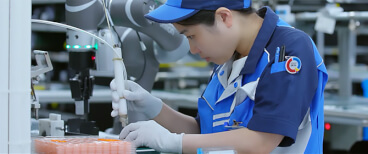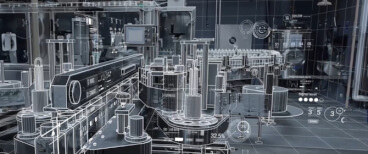The many dilemmas confronting the manufacturing industry
Market globalization, changing consumer needs, carbon neutrality goals, digitalization and other advances in production technology; birthrate decline and population aging; the evolving values of factory workers— These are just some of the rapid changes bombarding the manufacturing industry. To keep pace with these changes and cater to social needs essential to sustainable development, the manufacturing site must overcome several dilemmas.
The increasing risks faced by production sites overly reliant on human workers
With labor shortages intensifying, it is becoming increasingly risky for production sites to overly rely on human labor. In the capital-intensive manufacturing sector, this has accelerated labor-saving through investments in mechanization and automation. This mechanization and automation, however, must also be able to flexibly address diversifying consumer needs.
Management risks posed by decarbonization
Economic rationality—that is, producing better products at lower costs—is a constant challenge for the manufacturing industry. In view of social materiality, companies are also increasingly required to manufacture their products in ways that contribute to decarbonization and help preserve the global environment.
Securing talents and training workers faster
To beat competitors in the manufacturing industry, keeping pace with ongoing advances in production technologies is a must. With the declining number of manufacturing workers and shortage of highly-skilled engineers, however, securing and quickly training personnel that can make full use of such advanced technologies is getting more difficult every year.
Work-life balance and work satisfaction
Working environments that are safe and comfortable to work in, and empower workers to unleash their potential are required. Manufacturing sites must grant workers satisfaction and a sense of growth in their work, enabling them to engage in more creative activities.
A sustainable future through a new type of manufacturing site
OMRON’s goal is to help create a sustainable society by implementing sustainable automation that can co-exist with the global environment and deliver high worker satisfaction, while also driving the advanced evolution of manufacturing. Central to this endeavor are our state-of-the-art i-Automation! products, built on our three new concepts for manufacturing: "Autonomation Beyond Human Ability," "Advanced Collaboration Between Human and Machines," and "Digital Engineering Innovation."

Autonomation Beyond Human Ability
Maximizing on-site productivity through a new global perspective

Advanced Collaboration between Human and Machines
A new production site that allows for human-machine collaboration

Digital Engineering Innovation
Seamlessly integrating the production site through the Digitalized Three Reality Philosophy
